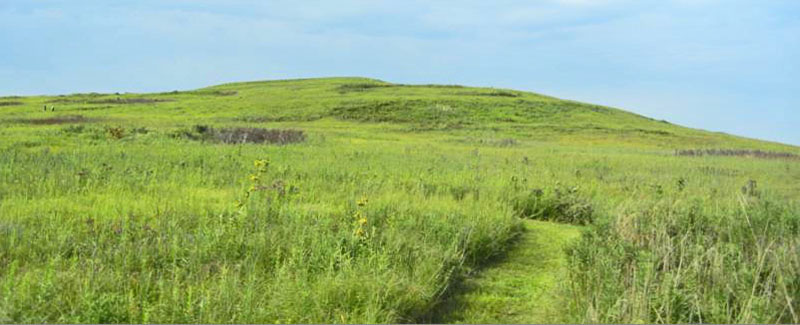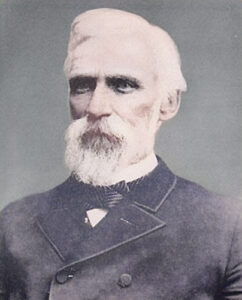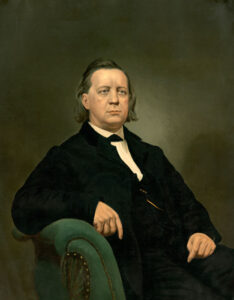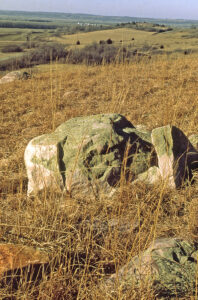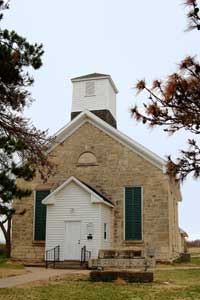Mount Mitchell is a hill in Wabaunsee County, Kansas, that looms over the rolling prairie of the Kansas River Valley.
The 50-acre hilltop prairie, part of the Mount Mitchell Heritage Prairie Park, is dedicated to Captain William Mitchell and the Connecticut-Kansas Colony. In 1856, William Mitchell and his fellow colonists, who were abolitionists, arrived in the Kansas Territory to ensure that Kansas would join the Union as a free state without slavery. They settled in Wabaunsee, located along the Kansas River in northern Wabaunsee County.
For American Indians, Mount Mitchell is a sacred hill where ancestors were buried some 1,500 years ago.
Mountain men and fur trappers traveling to and from the West used area roads in the 1820s.
In 1842, American Military Officer John C. Fremont, who scouted the Oregon Trail, is said to have made camp on a nearby hill seen from the top of Mount Mitchell.
Later, some of Kansas’ earliest settlers walked by this hill, covered in towering tallgrass.
A military road heading to Fort Riley wound around Mount Mitchell and through Manhattan before reaching the military post.
The departure from Connecticut to Kansas by the Connecticut-Kansas Colony in 1855 became a national sensation when Henry Ward Beecher, a preacher from Brooklyn, New York, helped raise funds to arm the colonists with Sharps rifles. He sent a check to the group’s leader, Charles Lines, to purchase the rifles and included a case of Bibles from one of his parishioners. Newspapers captured the moment with headlines proclaiming, “Bibles and Rifles for Kansas,” leading to the colony being referred to as “Beecher’s Bible and Rifle Colony.”
Captain William E. Mitchell, Jr. and his family arrived during the days of Bleeding Kansas, when Free-State and pro-slavery proponents were in armed conflict over the issue of slavery. Many historians now believe that the first shot of the Civil War was actually fired at the Battle of Black Jack in Douglas County, Kansas, on June 2, 1856, rather than at Fort Sumter, South Carolina, in 1861. For the William Mitchell family, this is a place to honor the sacrifices of an abolitionist grandfather and the Connecticut-Kansas Colony, which helped make Kansas a Free State.
The territorial road known as the Topeka-Fort Riley Road passes through the eastern edge of the preserve. Between 1857 and 1861, enslaved people seeking their freedom on the Underground Railroad used this road.
The 170-acre Mount Mitchell Heritage Prairie Park was originally part of Captain Mitchell’s farm. He was captain of the Prairie Guards, the local Free-state militia, and an Underground Railroad conductor and stationmaster. The park was created in 1953 when W.E. Mitchell’s youngest son bequeathed 30 acres of the farm’s tallgrass prairie to the Kansas State Historical Society on the condition that the society turn the site into a public park dedicated to his father.
However, when the Kansas Historical Society found itself unable to meet Mitchell’s son’s wishes, it was going to return the land to Mitchell’s descendants in 2006. Instead, a group of local citizens, with the support of the family, took on the task. Together with thousands of volunteer hours, they built benches, information kiosks, fences, and miles of trails to turn the site into a destination for those who want to walk across the tallgrass like the settlers did in the past. The Mount Mitchell Prairie Guards, a local non-profit grassroots group, now manages the preserve.
The park is a Freedom’s Frontier National Heritage Area attraction and a National Park Service Network to Freedom Site. It represents a significant link to the Bleeding Kansas story, Territorial Kansas, and the Underground Railroad.
Visitors can hike to the top of this stately hill, where they will be surrounded by undisturbed native prairie and see the remnants of the old trail. At the top stands a brass plaque commemorating the Connecticut-Kansas Colony, also known as the Beecher Bible and Rifle Colony, which settled in the Wabaunsee community. The park features displays about the area’s cultural history.
Across the road to the north of Mount Mitchell Heritage Prairie Park is the log cabin farmstead of Captain Mitchell, who, with his sister Agnes, sheltered freedom seekers on their perilous journey to freedom in Canada.
Two and a half miles of walking trails provide access to the park’s remarkably diverse plant community, which is alive with the songs of meadowlarks and other birds. The trails also provide access to limestones and shales formed from deposits in intermittent seas during the Permian Period about 250 million years ago, quartzite boulders carried in and dumped by glacial ice about 600,000 years ago, and a panoramic view of the Flint Hills and the Kansas River valley, which was etched out thousands of years ago by flowing and meandering streams.
The park has many species of milkweed, and it has been designated an official Monarch Butterfly Waystation. These fascinating insects can be seen in large numbers during their spring and fall migrations and as residents during the spring and summer.
From March through October, a colorful pageant of wildflowers and grasses delights visitors.
Today, the church that these and previous settlers built at Wabaunsee is called the Beecher Bible and Rifle Church.
The park is located along the Native Stone Scenic Byway, three miles south of Wamego on Highway 99 at Mitchell Prairie Lane. It is open to the public from dawn to dusk, 365 days a year. Plant and animal removal is strictly forbidden.
The park has two entrances: the main entrance is at 29000 Mount Mitchell Rd, Wamego, Kansas, and the South Entrance is at 29377 Mitchell Prairie Lane, Wamego, Kansas. At present, there are no facilities.
©Kathy Alexander/Legends of Kansas, updated May 2025.
Also See:
Native Stone Scenic Byway, Kansas
Wabaunsee County Photo Gallery
Sources:
Emporia Gazette
Kansas Geological Survey
Manhattan Mercury
Mount Mitchell Heritage Prairie Park
Travel Kansas

